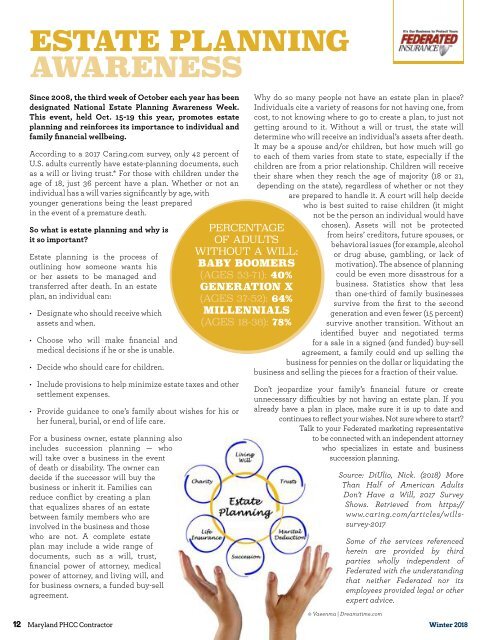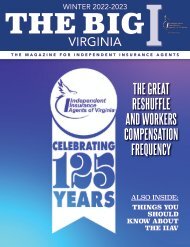Maryland PHCC Contractors Winter 2018
Create successful ePaper yourself
Turn your PDF publications into a flip-book with our unique Google optimized e-Paper software.
ESTATE PLANNING<br />
AWARENESS<br />
Since 2008, the third week of October each year has been<br />
designated National Estate Planning Awareness Week.<br />
This event, held Oct. 15-19 this year, promotes estate<br />
planning and reinforces its importance to individual and<br />
family financial wellbeing.<br />
According to a 2017 Caring.com survey, only 42 percent of<br />
U.S. adults currently have estate-planning documents, such<br />
as a will or living trust.* For those with children under the<br />
age of 18, just 36 percent have a plan. Whether or not an<br />
individual has a will varies significantly by age, with<br />
younger generations being the least prepared<br />
in the event of a premature death.<br />
So what is estate planning and why is<br />
it so important?<br />
Estate planning is the process of<br />
outlining how someone wants his<br />
or her assets to be managed and<br />
transferred after death. In an estate<br />
plan, an individual can:<br />
• Designate who should receive which<br />
assets and when.<br />
• Choose who will make financial and<br />
medical decisions if he or she is unable.<br />
• Decide who should care for children.<br />
• Include provisions to help minimize estate taxes and other<br />
settlement expenses.<br />
• Provide guidance to one’s family about wishes for his or<br />
her funeral, burial, or end of life care.<br />
For a business owner, estate planning also<br />
includes succession planning — who<br />
will take over a business in the event<br />
of death or disability. The owner can<br />
decide if the successor will buy the<br />
business or inherit it. Families can<br />
reduce conflict by creating a plan<br />
that equalizes shares of an estate<br />
between family members who are<br />
involved in the business and those<br />
who are not. A complete estate<br />
plan may include a wide range of<br />
documents, such as a will, trust,<br />
financial power of attorney, medical<br />
power of attorney, and living will, and<br />
for business owners, a funded buy-sell<br />
agreement.<br />
PERCENTAGE<br />
OF ADULTS<br />
WITHOUT A WILL:<br />
BABY BOOMERS<br />
(AGES 53-71): 40%<br />
GENERATION X<br />
(AGES 37-52): 64%<br />
MILLENNIALS<br />
(AGES 18-36): 78%<br />
Why do so many people not have an estate plan in place?<br />
Individuals cite a variety of reasons for not having one, from<br />
cost, to not knowing where to go to create a plan, to just not<br />
getting around to it. Without a will or trust, the state will<br />
determine who will receive an individual’s assets after death.<br />
It may be a spouse and/or children, but how much will go<br />
to each of them varies from state to state, especially if the<br />
children are from a prior relationship. Children will receive<br />
their share when they reach the age of majority (18 or 21,<br />
depending on the state), regardless of whether or not they<br />
are prepared to handle it. A court will help decide<br />
who is best suited to raise children (it might<br />
not be the person an individual would have<br />
chosen). Assets will not be protected<br />
from heirs’ creditors, future spouses, or<br />
behavioral issues (for example, alcohol<br />
or drug abuse, gambling, or lack of<br />
motivation). The absence of planning<br />
could be even more disastrous for a<br />
business. Statistics show that less<br />
than one-third of family businesses<br />
survive from the first to the second<br />
generation and even fewer (15 percent)<br />
survive another transition. Without an<br />
identified buyer and negotiated terms<br />
for a sale in a signed (and funded) buy-sell<br />
agreement, a family could end up selling the<br />
business for pennies on the dollar or liquidating the<br />
business and selling the pieces for a fraction of their value.<br />
Don’t jeopardize your family’s financial future or create<br />
unnecessary difficulties by not having an estate plan. If you<br />
already have a plan in place, make sure it is up to date and<br />
continues to reflect your wishes. Not sure where to start?<br />
Talk to your Federated marketing representative<br />
to be connected with an independent attorney<br />
who specializes in estate and business<br />
succession planning.<br />
Source: DiUlio, Nick. (<strong>2018</strong>) More<br />
Than Half of American Adults<br />
Don’t Have a Will, 2017 Survey<br />
Shows. Retrieved from https://<br />
www.caring.com/articles/willssurvey-2017<br />
Some of the services referenced<br />
herein are provided by third<br />
parties wholly independent of<br />
Federated with the understanding<br />
that neither Federated nor its<br />
employees provided legal or other<br />
expert advice.<br />
© Vaeenma | Dreamstime.com<br />
12 <strong>Maryland</strong> <strong>PHCC</strong> Contractor <strong>Winter</strong> <strong>2018</strong>


















